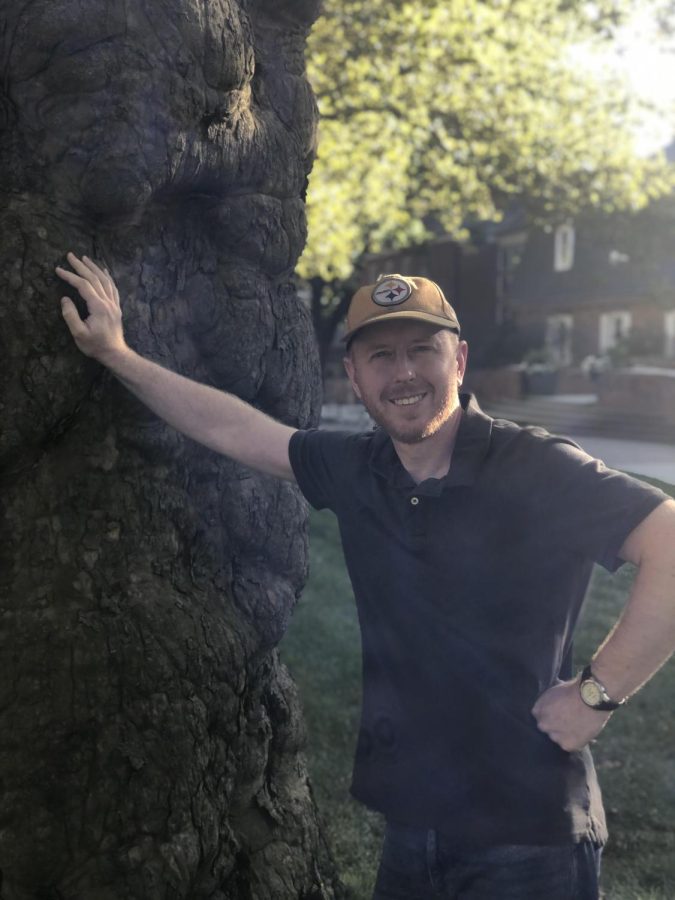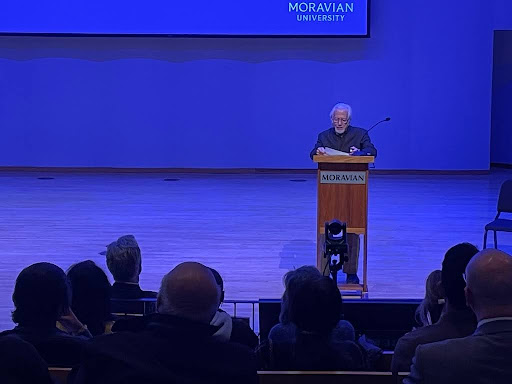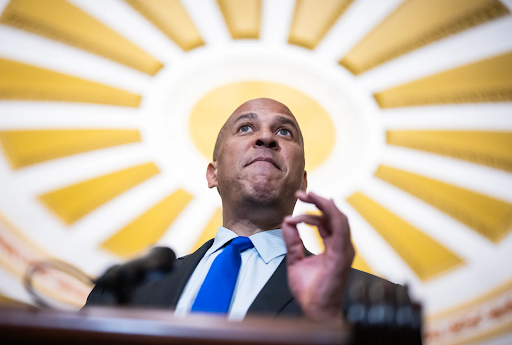Jeff McClelland: The Identity of a Comic Book Writer
The comic book writer sinks into the black chair in his in-home office, as he meticulously creates his own font on a white page. Sporting his trademark baseball cap, t-shirt, and shorts, he rests his foot upon the desk, which holds his massive statue collection and knock-off toys of The Thing. His comics are piled on the floor around him. His “Weird Al” Yankovic props sit within arm’s reach of his workstation, waiting to be shown off to any visitor.
Jeff McClelland’s comfortable at home doing what he loves best, writing and laying out the pages of his own comic books. The quirky, humble, humorous writer said he found his corner of success in a difficult industry. And he’s loving every second of it.
McClelland is a New York Times bestselling author known for his works on such popular comic book series as “The Tick,” “Honcho,” “Flutter,” “Black Terror,” and most recently, a Kickstarter-funded throwback series called “Planet Comics.” His passion and success in the comic industry allow him to teach two comic-related classes at Moravian University this semester where he discusses the meaning of comic storytelling with students.
Spending some decades in a notably fun, yet complex, field, McClelland took a passionate childhood hobby and made it a career, maintaining his heart and humor along the journey.
“You got to make a living, but if you can do something that you like, and that is creatively fulfilling for you, you are so much better off then,” says McClelland. “I know a lot of people that I went to high school with, who were probably more traditionally successful but also miserable. And I would hate to be in their shoes.”
Growing Up
A middle child, McClelland says he feels he escaped the pressure his parents placed on his older sister but did not enjoy the leniency his younger sister had. He discovered that sports weren’t really his thing after failing at soccer and T-ball, so instead, he leaned toward books. He said he loved reading and that love increased when comics entered his life after his father gifted him his very first collection of Marvel books from the 1970s featuring The Avengers, Fantastic Four, and Spider-Man at some point in his early childhood.
“I read ’em’ till the covers fell off,” says McClelland. “I found things I liked that also annoyed parents and leaned into it.”
His father shared a weekly tradition of buying every comic on the racks and bringing them home with his three siblings as a child. McClelland glances off to the corner of the room, lost in nostalgia. He says that these moments, where parents and children connect through comics, feel like something from a utopian society. His voice quickens when he says, “We had literally millions of dollars of comics, coming through (his father’s childhood) kitchen.” He’s unsure where most of his father’s comics are now, but he’d like to get his hands on them since their value has increased over the decades.
McClelland dabbled in the creative process when he received a book about how to draw funny characters. He said he enjoyed taking the characters he created and placing them into odd situations. Around eighth grade, he created “Food Eating Comics,” where he would take classmates and draw them in what he called a weird way, accentuating their standout features, such as a classmate they called “Big Country” who was taller than the rest of his grade. McClelland boosted his height to emphasize his friend’s appearance. Then he would have the characters eat food using inside jokes from his friends in the dialogue.
“When I was in college or high school, I found it again and looked at it,” says McClelland. “I was thoroughly embarrassed by everything that was in there.”
First Publication
His first publication was for a class project in his senior year at Waynesburg University (PA) in 2003. He said he had to take a fairytale and rewrite it from a different perspective. He chose to rewrite “Hansel & Gretel” from the perspective of the witch. McClelland found an artist on a message board and collaborated with him to get the comic together with artwork included. He entered his story in a contest for the publisher Dark Horse Comics, since they started focusing on digital comics and wanted to gain attention. In a low voice, he says he stalked the website page, voting for his comic as much as he could so it would be chosen with a bunch of other short stories. He’s unsure if it was from the voting he and his friends did, but he was chosen as a winner and his story was included in a collection with 12 other works.
“It gave me a really skewed understanding of how the industry works and certainly of my own skill,” says McClelland. “I just thought, ‘Everything I touch turns to gold,’ so I’m gonna do what I want and be the next prodigy, and I will take the industry by storm.”
It was several years before McClelland had anything else published. That first comic, he says, is still a high point of his career.
The Comic Industry
Since then, McClelland has been a successful, published author in the comic book industry, working on series such as “The Tick,” “Flutter,” “Honcho,” “Black Terror,” and most recently, his own anthology series “Planet Comics.” The comic book industry isn’t as easy as it seems, he said, since it’s not necessarily lucrative, and it’s hard to get noticed. Because of this, McClelland had to build connections with other artists and writers to find his footing and generate profitable content. He says it’s a matter of “good luck” in finding the right people who share a similar artistic vision and are willing to collaborate on a project. For him, comic conventions always seem to be best for meeting new people.
After the initial meeting process, it’s a matter of building networks, he says. McClelland met frequent collaborator Jeff McComsey, a Pennsylvania comic book artist, through a comic con in 2010 after the two were placed next to each other due to the similarities in their names. They related over their names and ages and found a common interest in the way they told their stories, one through art, another through writing. Jennie Wood, the award-winning author of “Flutter,” met McClelland through McComsey. The three of them worked on “Flutter” together for Dark Horse Comics. McClelland worked as an editor on the series and also provided lettering (font and text) to the pages. Now the three collaborate often, especially in “Planet Comics,” which relies on work from a large assortment of writers and artists.
“The industry is small and it tends to work out that you meet a lot of people online or that you’ve worked with before,” says McClelland. “It’s also pretty easy to figure out who the good people are and who the not-so-good people are. If you associate yourself [with the good people] you’re also associating yourself with their circle.”
The Continued Collection
When McClelland’s not creating his own comics, he’s buying them.
McClelland talks about his ongoing collections with a smile on his face. He says he’s unsure if it’s his personality, but he feels he has a sense of loyalty to some titles. “Fantastic Four,” for instance, is his favorite, and he says he’ll never stop collecting, “unless a tornado comes and blows the house down.” He supports the comics he likes and takes no shame in his collections of statues, figures, and books, despite their cost and the space they take up. His office is filled with them, yet he says most of the comics are stored at his father-in-law’s house since he needs to keep some of the space clear so he can focus.
McClelland is also a huge fan of “Weird Al” Yankovic, the singer, and actor known for parodies and humorous songs that make fun of the very industry he’s in. It shows through McClelland’s collection. As a kid, he became interested in Weird Al because of his willingness to break the norm and sing about weird things on the radio. As an adult, McClelland says he had the pleasure of working with Weird Al on a few projects. McClelland designed concert posters promoting Weird Al’s 2019 “Strings Attached” tour, but the Weird Al love runs deeper. For instance, McClelland says he paid an “unfortunate amount of money” for a pajama set that was given out to the crew on the last tour. He owns props as well, such as a bass guitar from a tour in the 1980s, a costume Weird Al wore on stage, a pretend guitar that was busted up on stage, and more, definitely more. He was even recognized and interviewed as a “superfan” and collector on “Dave & Ethan’s 2000’ Weird Al Podcast.”
It’s Clobberin’ Time…For McClelland’s Wallet
As a “Fantastic Four” fan, McClelland’s favorite comic book character is Ben Grimm, AKA The Thing, a key member of the Fantastic Four who was exposed to radiation and became a rock-human hybrid. He’s described as a rock-type monster with a heart of gold since the character grew up in poverty on the Lower East Side of Manhattan. He carries the personality and style of a New Yorker, but the form and threat of a monster from space.
The reason McClelland likes him so much? He says it’s a mix of self-awareness of the goofy side of comics but also what the character represents. McClelland values that The Thing represents an “everyman” or a lower-class kid from the early 20th century. He says he likes that The Thing has not been reinvented for modern standards of storytelling and still represents a person who fights for people weaker than him.
To show his love for this character, McClelland collects almost any merchandise of The Thing he can get his hands on. With a shriek at the mere mention of the character, he moved quickly to show a huge statue that was reaching distance from his computer. McClelland’s entire right hand could cover only one leg on the giant statue when he held it, then he pulled out an assortment of bad knock off figures of The Thing. Blotchy, red paint and stiff arms make the figures look cheap, yet McClelland displays them happily. He says, “It’s so bad, it’s good. Not a lot of people would appreciate things like that. I think the best collections are ones that are focused or limited to really nice display items, but some of my stuff is just junk.”
McClelland also purchases rare early draft artworks of the character and posts about them frequently on his Twitter account to his followers and friends. He says he has about 300 original artworks, and maybe more in other collections.
“Planet Comics” and Kickstarter Creator
“Planet Comics” is McClelland’s current project. It’s a throwback series to the Golden Age of comic books that share vast stories about aliens and adventures in space. Three books were published and distributed through Kickstarter, a crowdfunding website. McClelland works as his own publisher under the name Wagon Wheel Comics. When he’s not writing a story, he’s working on the page layouts, lettering, and manufacturing process. He asks for about $2,500 from backers, which covers the printing and distribution process.
To gain attraction and sales, McClelland needed to craft a number of payment tiers on Kickstarter that offer incentives for people to buy the book. If a backer pledges $50, he or she will receive an original typewritten story. McClelland laughs when discussing this tier and what it says about his personality.
“I mean, talking about narcissism. How insufferable am I that I bought an actual typewriter?” McClelland says with a grin. “I have it sitting right next to the TV, so it has a space of prominence in the house.”
Creating comics is not necessarily about the profit for McClelland, as he is proud of the corner of the industry his work resides in, where people support him and read his content but don’t exactly raise him to fame. He says he’s happy about the comics he creates and what he earns. His voice is clear and focused when he talks about his success and loses eye contact when he goes on tangents. He can branch away from a conversation for minutes but always wrap back around to the original question. Even after a reporter’s recording device and notebook have been put away, he’ll hold a conversation. A goodbye turns into 15 minutes if he’s asked about any recent Marvel show or movie.
Teaching About Comics
When McClelland isn’t creating his own books, buying stuff, or working as an extra actor in movies like Netflix’s 2021 film “Sweet Girl,” he’s teaching. At Moravian University he teaches two LinC First-Year Writing Seminar courses called Everything I Need To Know, I Learned From Comic Books, which uses comics and graphic novels to explore the medium and how it relates to traditional readings and writings. He also taught a 300-level course in spring 2021 that focused on the industry and creation process.
“Comics is such a small field that most other people have different focuses and really wouldn’t know what would be good,” he says. [Moravian] just kind of trusts my judgment. It’s kind of trying to walk that line of having a serious approach to a visual topic like comic books.”
Samantha Riley, who graduated from Moravian in 2021, took McClelland’s 2021 “Comics and Graphic Storytelling” course. “Jeff was really laid back, which made it easy to feel comfortable in class,” she said. “He always allowed for open discussion on different industry-related topics, even if it strayed away from the lesson that he had scheduled that day. I enjoyed reading the graphic novels and then going on to watch the film versions in class.”
Senior Anna Litofsky, ’22, an English major and creator of “Behind the Mask,”said, “He was very fun as a professor. Very funny, witty, and passionate, and clearly knew what he was talking about and loves comics a lot. There’s always a really fun blend of goofy conversations and serious learning that made class very interesting. He was also very supportive to me. He reached out a couple of times asking me to do illustrations and comic work for him, which as a student, was extremely encouraging.”
Corner of Success
While McClelland loves the industry and the chance to create stories with his friends, he says there are aspects to this industry that upset him.
“Generally speaking, you don’t make comics unless you love them because they are very time-consuming,” said McClelland. “They’re not very financially profitable.”
And, like many creative occupations, writing and illustrating comics and graphic novels is a very difficult industry to break into. “It’s not as welcoming to some people as it should be,” McClelland said. “I see some people, who are former nerds and now have a little bit of power, turn around and hold that against other people.” He finds that frustrating and tries his best to welcome and encourage newcomers. “I don’t want other people to feel the rejection that I have felt just trying to get people to look at my work.”







